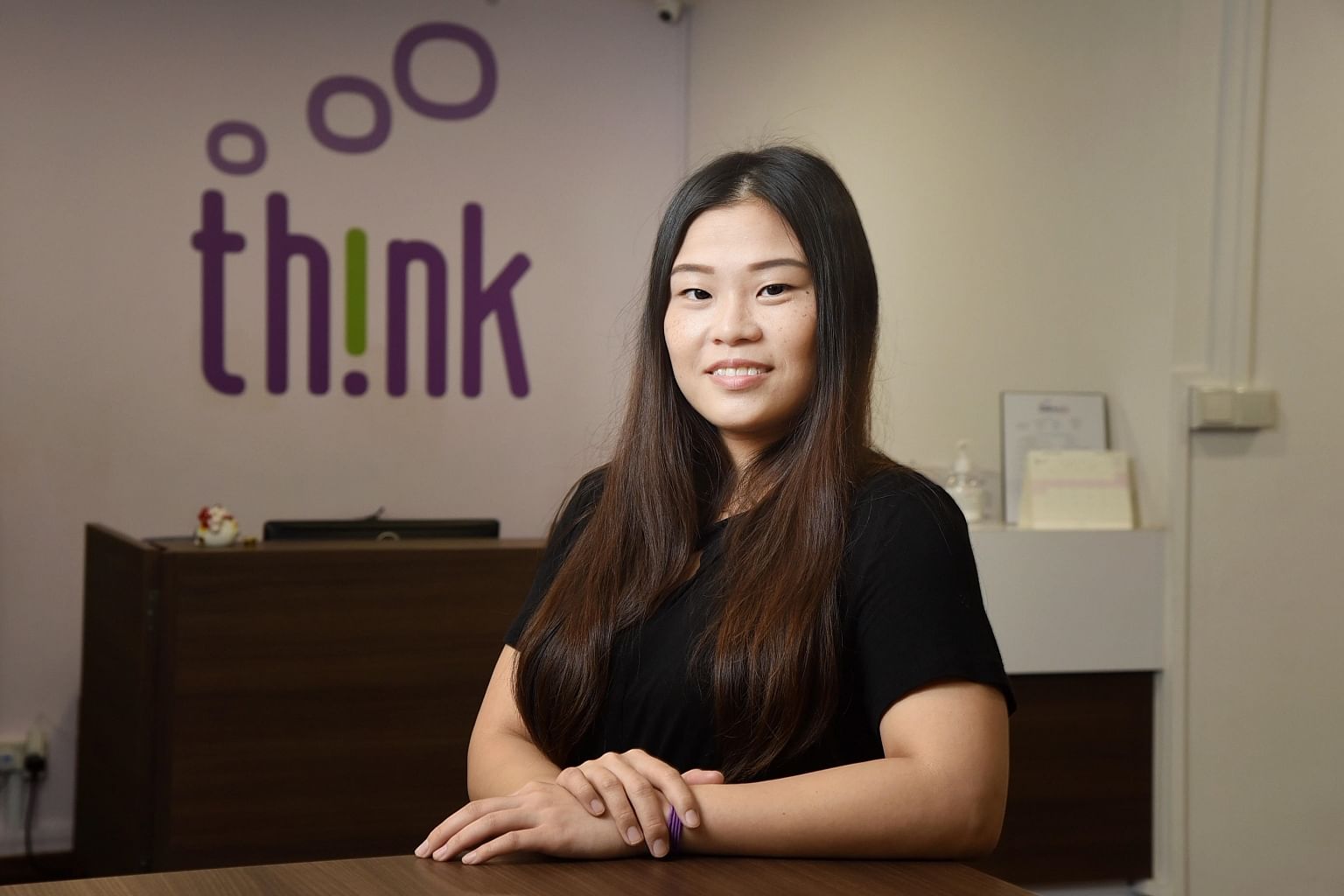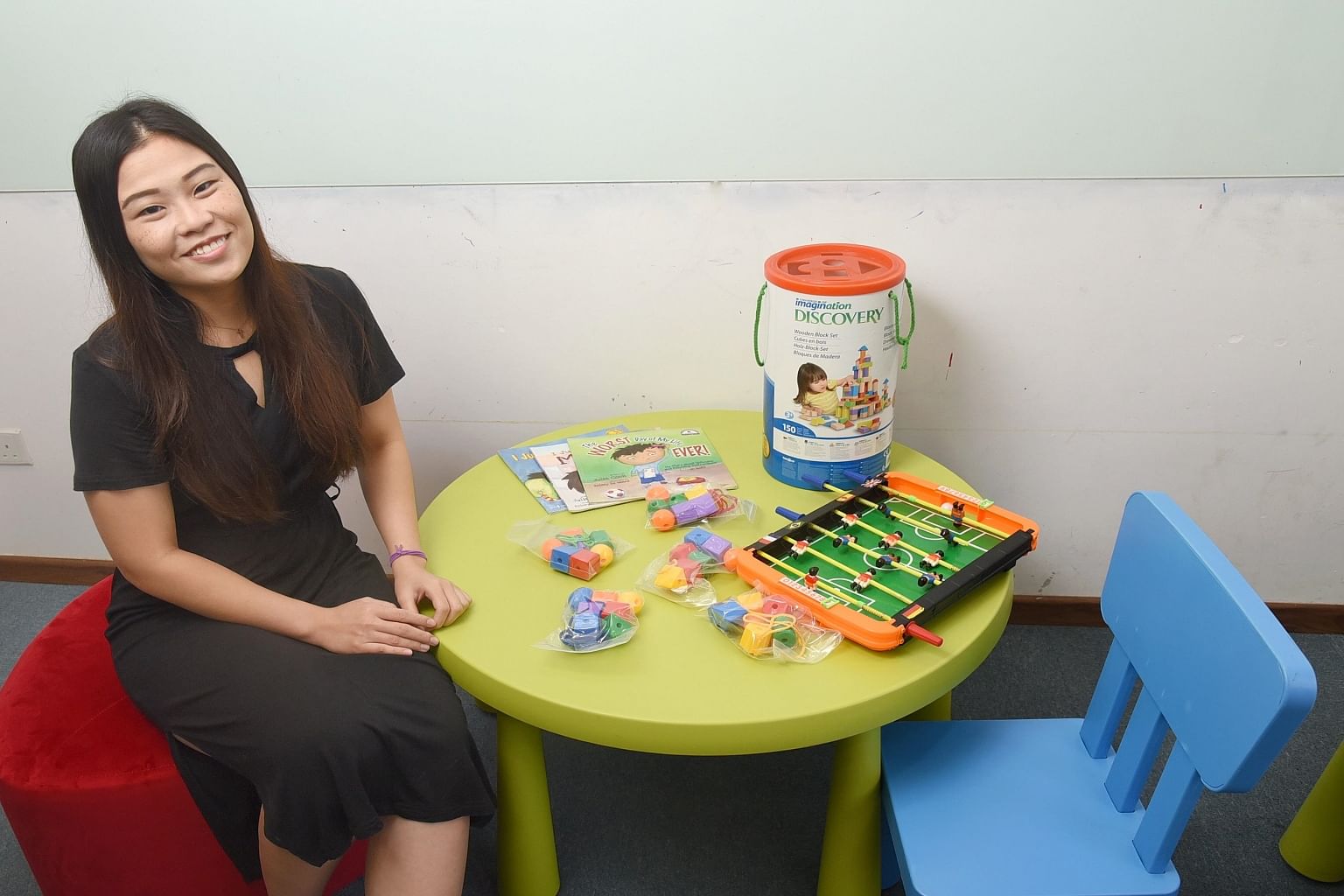BRANDED CONTENT
This counsellor pursued a Masters to better support the emotional needs of children with special needs
James Cook University’s Master of Guidance and Counselling programme gave Ms Chan Peilin the confidence to help her clients process and manage difficult emotions so that they, too, can thrive

Ms Chan is a counsellor who focuses on children with special needs and their families – an area that is not very common in Singapore and even around the world. PHOTO: SPH MEDIA
When Ms Chan Peilin was in secondary school, she was diagnosed with dyslexia and tactile defensives (high sensitivity to touch).
"Before my diagnosis, I was often misunderstood as being lazy or difficult when I couldn’t keep up," she recalls.
Now, the 27-year-old hopes to give those facing similar struggles a voice. She is working as a case supervisor and counsellor at Think Psychological Services, where she supports working adults, teenagers and children with special needs on their journey of self-discovery.
As a behavioural therapist, she helps to equip them with skills to weather the stresses of life, focusing on changing any negative harmful behaviour, as well as dealing with thoughts and feelings that lead to self-destructive habits.
She also works with neuro-typical (individuals with typical neurological development or functioning) as well as atypical children (those who lag behind or are way ahead of same-age peers in different skills) so that they can live life to their fullest potential.
It is a challenging and emotionally draining role, and over the past five years, Ms Chan has found that sometimes the clients whom she failed to help adequately leave the biggest impact on her practice.
She remembers working with three-year-old Jay (not his real name) who had high-functioning autism. He could handle basic life skills such as eating and getting dressed. At first, their sessions had a behavioural focus, and they worked on enhancing his cognitive and social skills. "He was thriving. If you saw him then, you would not suspect that he was on the spectrum. He was one of my proudest achievements," she says.
It all changed when he started attending mainstream pre-school. He found it difficult to make friends and was bullied for being different. He began crying and refusing to go to school. While Ms Chan was able to help him iron out his behavioural quirks, he became an emotional wreck.
Then, there was Kate (not her real name), whose autism was so severe that even at age two, it was apparent that she would never be fully independent. Ms Chan witnessed the impact on her family, as well as her parents’ marriage and mental health. "I listened to her mother’s stories and sat with her while she cried. I felt helpless as I was unable to support her adequately," Ms Chan says.
She realised that while she had been trained to support her clients behaviourally, she lacked the skills to help with their emotional needs.
She explains: "Although behavioural therapy has shown tremendous results in improving the conditions of children with special needs, it cannot fully provide a holistic intervention. For instance, some higher functioning children may struggle with many social-emotional issues.
"I also face many grieving, anxious and even angry parents who are in denial of their child’s condition. No one seems to understand the daily struggle these parents face and the never-ending grieving process."

Freedom and flexibility
To better support both the practical and emotional needs of families and individuals with special needs, Ms Chan decided to pursue a Master of Guidance and Counselling (MGC) in 2017.
The course, which provides advanced academic and practical training in the professional discipline of counselling, is designed to meet the developmental needs of individuals wishing to enter the counselling profession, and those seeking to cultivate important human and interpersonal skills in other professions.
The course, which is recognised as an initial counsellor training course by the Singapore Association for Counselling and the Australian Counselling Association, enables graduates to practise in both countries and internationally.
Ms Chan, who already holds a double degree in psychology and business administration and management, picked the course at the Singapore campus of James Cook University (JCU) due to its blended learning structure. "It allows a working professional like me to better manage and plan my time. With greater flexibility, I can learn new skills in the classroom and then apply and practise them at the workplace for a more holistic learning experience," she says.
Her JCU experience exceeded her expectations. "I was expecting the course contents to be generic – very theoretical and with conventional intervention methods for the general population. Much to my surprise, the lessons were all very interactive and practical, with freedom for self-exploration."
Lessons and assignments were all student-led – based on questions or topics that they asked about. Projects and coursework were very dynamic and broad, which enabled students to research and work on issues that interested them. For example, for one of her projects, Ms Chan developed a career plan for an individual with special needs. "As each student has different interests and experiences, it expands and makes whatever we learn more applicable," she adds.
Course lecturers such as Dr Geoffrey McNulty were focused on helping the students to develop professional skills and personal growth. Ms Chan recalls: "Dr McNulty was always very sharp in highlighting our thought patterns, and challenging us to grow to become better students and ultimately professionals.
"He pushed and empowered me to be more introspective and willing to learn about myself. This has carried me through my professional struggles as well as personal ones," she says.
Better tomorrow
Ms Chan is grateful that JCU provided her with the freedom to explore the type of counsellor and professional that she wants to be in a safe and guided space.
She says: "JCU gave me the confidence and specific skill set that I need to be a counsellor who focuses on children with special needs and their families. This is an area that is not very common in Singapore and even around the world.
"I gained new perspectives, research skills and the ability to listen more intuitively to what my clients need."
Now, Ms Chan is more comfortable dealing with difficult emotions, and empathises better with her clients. She understands and views cases in a different light, and also has sharper problem-solving skills.
Already, she has experienced breakthroughs in her previous cases. During her sessions with Jay, she helps him to manage his emotions and coaches him in developing problem-solving techniques. "I teach him how to name his emotions and to manage big feelings," she says.
As for Kate’s parents, she feels she can now more adequately support them in their grieving process, apart from helping their child.
She says: "The MGC supports not only the development of a counsellor’s professional skills, but also, more importantly, their personal growth. The best part is, the skills you gain can be applied in all industries and situations. It is a truly life-changing experience."
Visit this website for more information on the Master of Guidance and Counselling programme offered at James Cook University.


